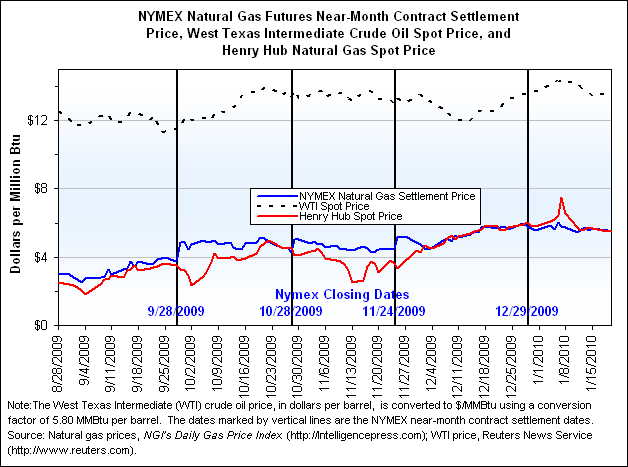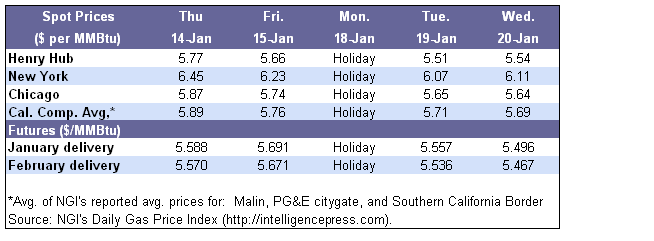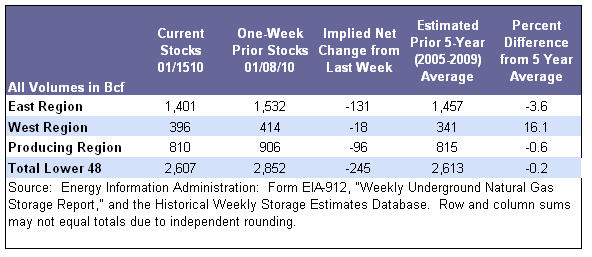Natural Gas Weekly Update Text
Released: January 21, 2010 at 2:00 P.M.
Next Release: Thursday, January 28, 2010 |
|
|
|
|
Overview (For the Week Ending Wednesday, January 20, 2010)
|
|
- A reprieve from the extreme cold in much of the country during this report week limited space-heating demand, resulting in price declines. The biggest decreases occurred in the Northeast. During the report week (January 13-20), the Henry Hub spot price decreased $0.07 to $5.54 per million Btu (MMBtu).
- At the New York Mercantile Exchange (NYMEX), futures prices also decreased. The futures contract for February delivery decreased by $0.24 on the week to $5.496 per MMBtu.
- As of Friday, January 15, working gas in underground storage was 2,607 billion cubic feet (Bcf), which is 0.2 percent below the 5-year (2005-2009) average.
- The price of West Texas Intermediate (WTI) crude oil decreased on the week by $2.24 to $77.42 per barrel, or $13.35 per MMBtu, the lowest price for WTI crude oil in 4 weeks.
|
|
|
 |
|
More Summary Data
|
|
| Prices |
|
|
As the extreme cold left much of the lower 48 States this week, natural gas demand for space heating and as a fuel for electric power plants fell precipitously. Compared with the prior report week, U.S. natural gas average daily demand decreased about 25 percent from 106 Bcf to 79 Bcf, according to Bentek Energy LLC. Combined demand in the residential and commercial sectors decreased 27 percent to 41 Bcf per day. Lower demand led to widespread declines in prices that were generally less than 5 percent. The Henry Hub price decreased on the week by $0.07 per MMBtu, or 1 percent, while prices at other markets in the Gulf of Mexico Producing region decreased as much as 3 percent. The spot price for natural gas in Florida finished trading yesterday at $5.79 per MMBtu following a decline of $0.99 per MMBtu on the week, providing an exception to the somewhat modest price decreases elsewhere in the lower 48 States. The sustained cold in December and early January has raised prices significantly in the last 6 weeks. Wednesday’s Henry Hub price of $5.54 per MMBtu was 29 percent higher than the price of $4.30 per MMBtu on December 1.
Prices in the Northeast were the highest in the country, with prices at a number of markets in the region still above $6 per MMBtu. Nonetheless, several market centers in the Northeast region posted declines of close to $0.30 per MMBtu, or more than 4 percent on the week. For delivery in Zone 6 (New York) off Transcontinental Gas Pipe Line, the price yesterday (January 20) averaged $6.11 per MMBtu, which was $0.28 less than the price the previous Wednesday. During the report week, the Transco Zone 6 price was, on average, about $0.63 per MMBtu higher than the Henry Hub’s, a significant decrease from the prior week’s average differential of $3.33 per MMBtu. The closely-watched difference in the Northeast price over Gulf of Mexico regional prices tends to fluctuate severely during the winter. Interstate pipelines have limited flexibility to transport non-firm supplies between the two markets because of colder weather and the associated increase in space-heating demand in the Northeast, causing differences in local supply and demand conditions to develop. The lower premium during this report week was the result of temperatures in the Northeast rising to above-normal levels, limiting heating demand and allowing greater flexibility on the region’s transportation system.
Further to the west, week-to-week price decreases were minimal in the Rockies and California markets. At Rockies trading locations, price decreases were generally less than 1 percent. The price for supplies on Kern River Pipeline in Utah (for delivery into California) decreased just $0.03 to $5.16 per MMBtu. Yesterday’s price of $5.10 per MMBtu for natural gas off of Colorado Interstate Pipeline Company (the lowest price in the country) represented an increase of $0.03 cents per MMBtu on the week. Despite the relative strength in the week-to-week price differences, several Rockies prices have drifted lower in recent weeks relative to prices in other regions of the country. For example, the price at the market center at Opal, Wyoming, averaged $0.45 per MMBtu lower than the Henry Hub during the report week, compared with just $0.02 during trading for the first 5 days of December 2009. This price weakness relative to other parts of the country may be developing because of operational limitations on the Rockies Express Pipeline, which has been undergoing maintenance intermittently since mid-November. The pipeline now provides Rockies producers improved access to eastern markets with a capacity of 1.8 Bcf per day to eastern Ohio. However, many of the Ohio delivery points have been unavailable to shippers since the year began.
U.S. imports of natural gas, including liquefied natural gas (LNG), were significantly lower during the report week in comparison with the prior week. According to Bentek, which monitors flows on the continental pipeline network, U.S imports from Canada during the report week decreased 20 percent relative to the prior week to 7.4 Bcf per day. LNG imports (as measured by sendout from regasification terminals), which averaged 3.3 Bcf per day the prior week, averaged 1.5 Bcf per day during this report week. The declines in pipeline and LNG imports likely resulted from suppliers expecting relative price weakness during the week because of lower demand.
|
|

|
|
At the NYMEX, the price of the near-month contract (for February delivery) decreased $0.237 during the report week to $5.496 per MMBtu. With the weather outlook for much of the country indicating moderate temperatures will continue, the price of the February contract decreased in three of four trading sessions during the report week (there was no trading on Monday, January 18 owing to the Martin Luther King Jr. holiday). The February contract is now priced almost $0.32 lower than the final expiration price of the January 2010 contract. Downward price pressure also appears related to movements in the crude oil price, which has decreased this week to its lowest level in 4 weeks. At the end of trading yesterday, the 12-month strip, which is the average for natural gas futures contracts over the next year, was priced at $5.81 per MMBtu, a decrease of about $0.21 per MMBtu, or 3.5 percent, since last Wednesday.
|
|

|
|
More Price Data
|
|
| Storage |
|
|
Working gas in storage as of January 15 totaled 2,607 Bcf, following an implied net withdrawal of 245 Bcf during the report week, according to EIA’s Weekly Natural Gas Storage Report (WNGSR) (see Storage Figure). The 245-Bcf withdrawal during the report week is more than twice as large as the 5-year (2005-2009) average withdrawal of 118 Bcf, and is 49 percent larger than last year’s withdrawal of 164 Bcf. During the WNGSR’s report week, temperatures throughout the lower 48 States were considerably below normal, likely driving the higher-than-normal net withdrawal. The average temperature for the week ending January 14 was 29.3 degrees for the country, according to the National Weather Service. This temperature was 3.6 degrees lower than normal and 4.1 degrees lower than the comparable week last year (see Temperature Maps and Data).
Following last week’s net withdrawal of 266 Bcf, the 2-week withdrawal totaled 511 Bcf, exceeding the previous 2-week total withdrawal record of 483 Bcf, reported for the week ending February 9, 2007. The report also marks the first time in EIA’s 16-year history of weekly inventory data that combined net withdrawals from storage over the course of 2 consecutive weeks have exceeded 500 Bcf. The accelerated pace of withdrawals reported since January 1 has sharply reduced the storage surplus relative to historical norms. Storage levels as of January 1, 2010 were 281 Bcf in excess of last year’s level at that time. However, as of January 15 of this year, working natural gas in storage is only 22 Bcf more than its year-prior level. Natural gas storage inventories are now 6 Bcf below the 5-year average, after beginning the year 311 Bcf above the 5-year average.
|
|
 |
|
More Storage Data |
|
Other Market Trends |
|
CFTC proposes rule to increase regulation of energy futures and options markets. The Commodity Futures Trading Commission (CFTC) voted to propose a new rule that would impose position limits for futures and options contracts in major energy markets. CFTC, which held a public hearing on the proposed rule on January 14, said that the limits are intended to restrict concentration of positions and promote fair markets. A formula based on open interest would set aggregate limits. The rule would allow exemptions for entities that use futures markets to hedge physical risk (for example, airlines and oil and gas producers). Additionally, over-the-counter bilateral contracts would not be subject to proposed limits, and neither would transactions that take place on foreign boards of trade. The proposed rule is intended to bring uniformity to swap dealer exemptions. According to CFTC, names of exempted dealers would be made public and exemptions would be consistent. The proposed limits would affect physical and financial markets for Henry Hub natural gas, light sweet crude oil, New York Harbor No. 2 heating oil, and New York Harbor gasoline blendstock. More information on the proposed rule is available at: http://cftc.gov/ucm/groups/public/@newsroom/documents/file/energyrrulefactsheet.pdf. The full Notice of Proposed Rulemaking is available at: http://cftc.gov/ucm/groups/public/@newsroom/documents/file/proposedpositionlimitsrule.pdf.
|
|
| |
|
Natural Gas Transportation Update |
|
- ANR Pipeline Company reported restrictions on delivery in the Southeast gathering area as a result of unplanned repairs to Eunice compressor station in Louisiana and a reduction of offshore supplies. ANR Pipeline restricted Patterson-to-Eunice delivery to 760 MMcf per day between January 12 and 22. Based on nominations, the pipeline did not anticipate any impacts to service on its system.
- Tennessee Gas Pipeline reported high demand on its system in New England January 14-15 and requested that shippers balance their takes and deliveries in Zones 5 and 6, which serve Northeastern markets. The pipeline also announced that the CDM natural gas processing plant in Grand Chenier, Louisiana, was shut down on January 14 because of a compressor outage. Tennessee requested that all producers upstream of the plant shut in their production. Immediately before the outage, the plant was processing 112 MMcf per day of natural gas.
- Rockies Express Pipeline notified its shippers that it still expects to complete work on its system east of the Chandlersville compressor station by the end of January. However, the pipeline did not indicate that it will lift the force majeure on that segment this month. The pipeline is still required to receive approval from the Pipeline Hazardous Materials and Safety Administration prior to commencing service on the segment.
- Equitrans, LP reported that it is experiencing higher-than-normal field pressures as a result of a power outage at Dominion's Hastings extraction plant in West Virginia. Producers flowing gas upstream of delivery points into Dominon Transmission are experiencing increased pressures. Thus, Equitrans is rerouting gas flows to alleviate field pressures and to avoid shutting in flowing production. However, Equitrans may have to shut in flowing gas if field pressures rise to a level that jeopardizes the operational integrity of the pipeline.
- Sabine Pipeline announced that it will perform maintenance on the Trunkline Gas Company’s high-pressure interconnect at Henry Hub between February 23 and 26. The interconnect has no year-to-date flows, so no market impact is expected.
See Weekly Natural Gas Storage Report for additional Natural Gas Storage Data.
See Natural Gas Analysis for additional Natural Gas Reports and Articles.
See Short-Term Energy Outlook for additional Natural Gas Prices, Supply, and Demand.
|
|



